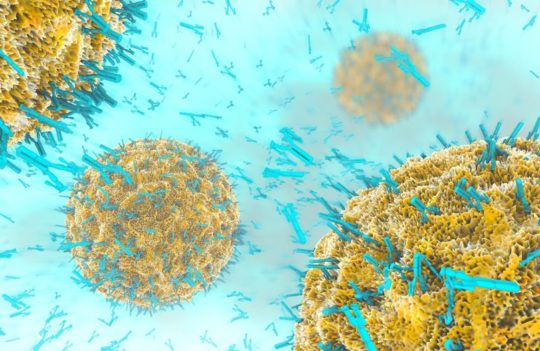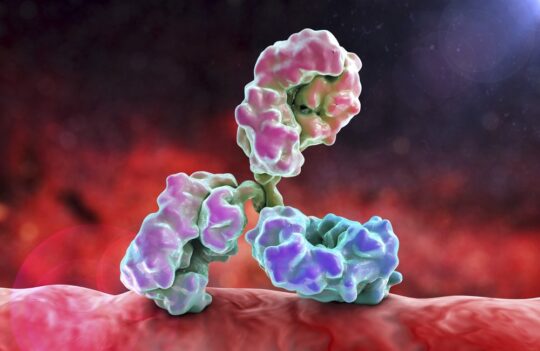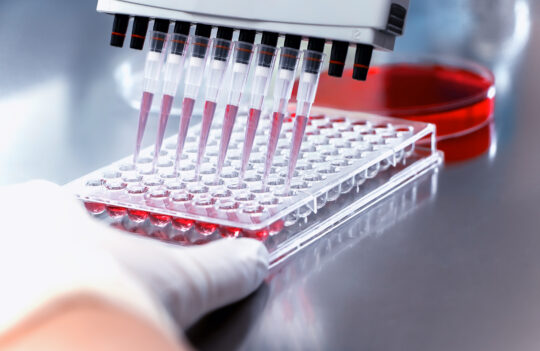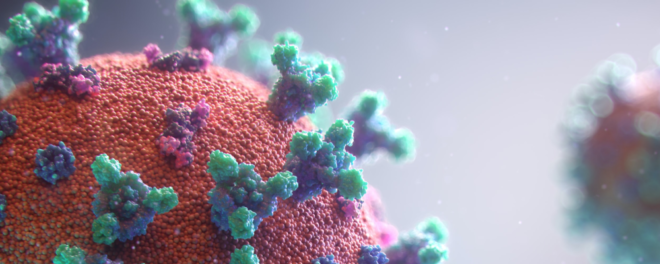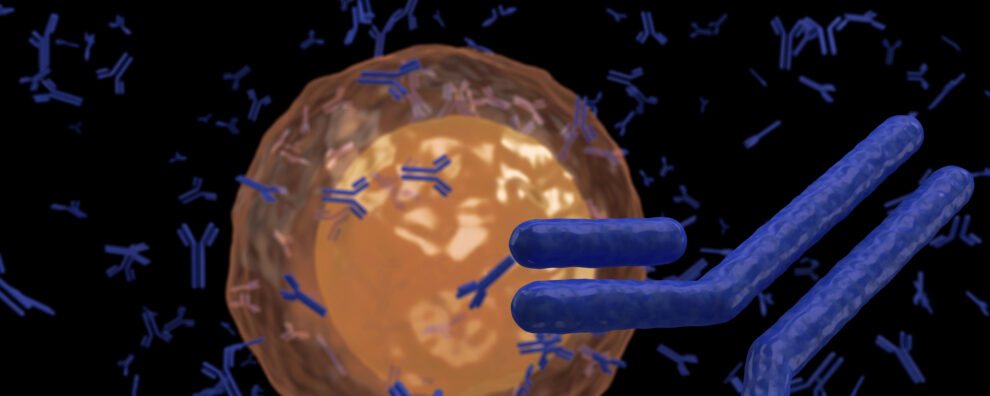 Antibody production
Antibody production
Overcoming the Hurdles of Antibody Production and Scale-Up
Therapeutic antibodies have revolutionized modern medicine by offering highly specific and effective treatments. Unlike traditional small molecule drugs, these biologics target specific antigens, reducing off-target effects and improving therapeutic outcomes. The journey of therapeutic antibodies began with hybridoma technology, enabling the production of monoclonal antibodies. These antibodies revolutionized cancer therapy by providing targeted treatment options that minimize damage to healthy cells. For instance, trastuzumab (Herceptin) has significantly improved survival rates in HER2-positive breast cancer patients. The recent COVID-19 pandemic also highlighted the importance of antibodies, with the rapid development of neutralizing antibodies offering a crucial line of defense. The development and production of therapeutic antibodies involve intricate processes that ensure their safety, efficacy, and scalability. Starting with the identification of target antigens, scientists use advanced bioinformatics, genomics, and proteomics to pinpoint and validate these targets. The generation and screening of antibodies involve sophisticated techniques such as phage display and single B-cell sorting, yielding candidates with optimal binding properties. The expression and production phase harnesses recombinant DNA technology, including gene cloning and using expression vectors in host cells to produce antibodies. The harvested antibodies undergo rigorous purification processes to achieve the required purity and potency. Preclinical and clinical trials then ensure their safety and efficacy, paving the way for regulatory approval and commercialization. Despite their success, producing therapeutic antibodies faces several challenges, including high costs and the need for optimized culture conditions to maximize yield and quality. Addressing these challenges involves integrating advanced technologies and optimizing the whole process of antibody production. This blog delves into each of these stages, discussing the scientific principles and technological advancements underpinning the development of therapeutic antibodies. Through this exploration, we highlight the significance of these biologics in modern medicine and their potential to shape the future of therapeutic interventions.
- Importance of Therapeutic Antibodies in Modern Medicine
- Overview of the Antibody Production Process
- Antibody Design and Selection
- Gene Cloning and Vector Construction
- Expression and Production
- Preclinical Testing, Clinical Development, and Commercialization
- Challenges in Antibody Production
- Gene Stability
- Cell Line Choice and Optimization
- Choice of the Expression System :
- Culture Conditions
- Tailored Media Formulations and Optimized Culture Conditions
- Optimization of Growth Conditions:
- High-Throughput Screening:
- Continuous Monitoring and Real-Time Adjustments:
- Scaling up and Stability of Production with Custom Cell Lines
- Regulatory Compliance
- Regulatory Compliance with Clonality Reports
- Comprehensive Documentation
- Quality Control and Stability
- Comprehensive Quality Control and Stability Studies
- Detailed QC Analysis:
- Stability Studies:
- Advanced Monitoring and Data Analysis:
- How ProteoGenix Can Help You Overcome Antibody Production and Scale-Up
- Comprehensive Custom Cell Line Development
- Tailored Solutions for Every Project
- Advanced Technologies and Proven Expertise
- Optimized Production Systems
- Why Choose ProteoGenix?
- Double Lock for Clonality Assurance
- Guaranteed Yields
- Reduced Costs and Enhanced Efficiency
- IP-Free Cell Lines
- Proven Expertise
- Flexibility and Customization
Importance of Therapeutic Antibodies in Modern Medicine
Overview of the Antibody Production Process
The production of therapeutic antibodies is a complex, multi-step process that involves several critical stages to ensure the final product is safe, effective, and suitable for clinical use. Here is an overview of the key steps involved:
Antibody Design and Selection
- Target Antigen Identification: The journey begins with identifying the antigen of interest, which could be a protein, peptide, or other molecule associated with a disease. Scientists utilize bioinformatics, genomics, and proteomics to pinpoint potential antigens. These targets are then validated through in vitro studies using cell cultures and in vivo models involving animals to confirm their relevance and accessibility.
- Antibody Generation: Once the target antigen is identified, various antibody discovery techniques such as hybridoma technology, phage display, or single B-cell sorting are employed to generate potential antibodies. These methods help create a diverse pool of antibodies that can specifically bind to the target antigen, providing multiple candidates for further development.
- Screening and Selection: The generated antibodies undergo rigorous screening for specificity, affinity, and functionality using assays like ELISA, flow cytometry, and surface plasmon resonance. The best candidates—those with optimal binding properties and desired biological activity—are selected for further engineering and development.
Gene Cloning and Vector Construction
- Gene Synthesis: The genes encoding the heavy and light chains of the selected antibody are synthesized using chemical synthesis or PCR amplification techniques. This step ensures that the genetic blueprints for the antibodies are ready for further manipulation.
- Vector Design: Next, expression vectors containing the antibody genes are constructed. These vectors include necessary regulatory elements such as promoters and enhancers to ensure efficient expression in host cells. This design is crucial for the successful production of antibodies in the subsequent steps.
- Cloning: The synthesized antibody genes are then cloned into the expression vectors. This involves inserting the DNA sequences into the vectors using molecular cloning techniques like restriction digestion and ligation or Gibson assembly. The resulting recombinant vectors are now ready for introduction into host cells.
Expression and Production
- Transfection: The recombinant vectors are introduced into host cells through methods such as electroporation, lipofection, or viral transduction. This step allows the host cells to take up the vectors and start producing the recombinant antibodies.
- Cell Line Development: Stable cell lines that consistently produce high levels of the antibody are developed. Screening and selecting high-producing clones is followed by expanding the selected clones and creating a master cell bank (MCB) and a working cell bank (WCB). These banks ensure consistent and reliable antibody production over time.
- Expression Optimization: To maximize antibody production, culture conditions are optimized. This involves fine-tuning parameters such as temperature, media composition, and pH to enhance cell growth and antibody yield, ensuring an efficient and cost-effective production process.
- Purification and Downstream Processing: The harvested culture supernatant, containing the recombinant antibodies, undergoes purification using techniques such as protein A affinity chromatography, ion exchange chromatography, and size exclusion chromatography. Downstream processing steps are optimized to remove impurities and achieve the desired purity, potency, and stability of the antibodies. This includes filtration, diafiltration, and formulation into the final product.
Preclinical Testing, Clinical Development, and Commercialization
- Preclinical Testing: Before clinical trials, the antibody undergoes extensive preclinical testing. In vitro studies assess binding, specificity, and mechanism of action, while in vivo studies in animals evaluate pharmacokinetics, biodistribution, efficacy, and safety. These tests help determine appropriate dosing and identify potential adverse effects.
- Clinical Development: Clinical development progresses through several phases. Phase I trials test the antibody in a small group of healthy volunteers or patients to assess safety, tolerability, and pharmacokinetics. Phase II trials evaluate efficacy and optimal dosing in a larger patient group, while continuing to monitor safety and side effects. Phase III trials involve large-scale testing to confirm efficacy, monitor side effects, and compare the antibody to standard treatments. This comprehensive data is essential for regulatory approval.
- Regulatory Approval: A Biologics License Application (BLA) or Marketing Authorization Application (MAA) is prepared and submitted to regulatory agencies such as the FDA or EMA. The application includes detailed production, preclinical, and clinical data. Regulatory agencies review the application, inspect manufacturing facilities, and evaluate clinical data before granting approval for commercialization.
- Commercial Manufacturing and Distribution: Once approved, manufacturing processes are scaled up to meet commercial demand while ensuring quality and consistency. Stringent quality control measures and regular batch testing are implemented to ensure compliance with regulatory standards. A distribution network is established to supply the antibody to healthcare providers and patients, including logistics planning and regulatory compliance.
- Post-Market Surveillance: After market introduction, ongoing pharmacovigilance monitors the safety and efficacy of the antibody in the general population. Adverse events are reported and product labeling is updated as necessary. Lifecycle management includes continuous improvement of the product and manufacturing process, as well as additional clinical studies to expand indications and enhance therapeutic profiles.
Challenges in Antibody Production
Recombinant antibody production is a complex process fraught with numerous challenges. Addressing these challenges effectively is crucial to ensure high-quality and consistent antibody production. This section outlines some of the key challenges and proposes solutions to overcome them.
Gene Stability
Ensuring the long-term stability of gene expression is crucial for maintaining high productivity and consistent antibody quality over time.
- Gene Amplification and Selection: Techniques such as methotrexate (MTX) selection in CHO cells or dihydrofolate reductase (DHFR) selection in DG44 cells are employed to amplify the genes of interest. This ensures that the cell line maintains high-level expression of the desired antibody over long periods. Gene amplification increases the copy number of the target gene, thereby enhancing its expression stability.
- Genetic Stability Testing: Long-term genetic stability is assessed through regular monitoring of the cell line’s genetic makeup. Techniques such as karyotyping, PCR-based assays, and next-generation sequencing (NGS) are used to detect any genetic drift or mutations that may occur over time.
Cell Line Choice and Optimization
Choice of the Expression System :
Selecting the appropriate antibody expression system is crucial for achieving optimal activity and yield. A multi-system expression can tailor solutions to specific needs, utilizing between two to five different expression systems to find the best match for project requirements. This ensures high productivity and functional activity. This comprehensive approach optimizes each step of the production process, leading to more efficient and effective antibody production. Leveraging expertise in various expression systems delivers the best possible outcomes for research and therapeutic applications.
Culture Conditions
Optimizing media and culture conditions to maximize the yield and quality of recombinant antibodies is a complex process that requires extensive experimentation.
Tailored Media Formulations and Optimized Culture Conditions
Optimization of Growth Conditions:
Once a cell line is selected, optimizing the growth conditions for batch and fed-batch cultures maximizes cell density and productivity. This involves fine-tuning factors such as nutrient supply, oxygen levels, and bioreactor parameters to achieve optimal performance. Optimized growth conditions ensure that the selected cell line consistently produces high yields of the desired antibody, maintaining quality and efficiency throughout the production process.
High-Throughput Screening:
Employing high-throughput screening methods to rapidly test various media compositions and culture conditions. This approach allows for the efficient identification of optimal media formulations and environmental parameters, significantly reducing the time and resources required for experimentation.
Continuous Monitoring and Real-Time Adjustments:
Implementing advanced monitoring systems to continuously measure key culture parameters such as pH, temperature, and oxygen levels. Real-time data from these systems enable immediate adjustments to maintain optimal culture conditions, thereby maximizing yield and quality.
Scaling up and Stability of Production with Custom Cell Lines
Custom cell line development is a pivotal strategy for addressing the complexities of scaling up antibody production. This process involves creating and optimizing cell lines specifically engineered to produce desired therapeutic antibodies at an industrial scale. By tailoring cell lines to meet specific production requirements, manufacturers can achieve enhanced productivity, stability, and overall efficiency.
Custom cell lines are engineered for genetic stability, minimizing the risk of genetic drift and mutations, thereby maintaining high productivity and quality throughout the production lifecycle. This genetic stability reduces variability and ensures consistent antibody characteristics. Additionally, these cell lines are optimized for phenotypic stability, ensuring they consistently exhibit desired traits such as high growth rates, efficient nutrient utilization, and robust antibody production. Phenotypic stability further contributes to predictable and reliable manufacturing processes, making custom cell lines a critical component in achieving consistent and high-quality antibody production.
Custom cell lines are also engineered for robustness, ensuring adaptability to various bioreactor conditions, which enhances flexibility in scaling up production and maintaining high performance across different scales and bioreactor types. This robustness minimizes production disruptions due to process variations. Additionally, the stability of custom cell lines ensures consistent antibody quality, crucial for therapeutic applications where batch-to-batch variation can affect efficacy and safety. Stable cell lines will also help in meeting stringent regulatory quality control standards, ensuring reliable and consistent production outcomes.
Regulatory Compliance
Ensuring monoclonality is essential for regulatory approval in antibody production. Regulatory bodies require detailed proof that a cell line is derived from a single cell, which is challenging to achieve with traditional methods.
Regulatory Compliance with Clonality Reports
Stable cell line development with VIPS™ technology addresses these stringent regulatory requirements through an advanced approach. It offers image-based proof of clonality from day zero, ensuring that each cell line starts from a single, visually confirmed cell. This “double-lock” method provides the incontrovertible evidence needed for regulatory approval, meeting the highest standards and eliminating the uncertainties associated with traditional methods. The visual confirmation ensures that regulatory bodies receive clear, undeniable proof of monoclonality.
Comprehensive Documentation
In addition to visual proof, VIPS™ technology generates detailed clonality reports that facilitate compliance with regulatory standards. These reports provide a reliable audit trail, essential for regulatory submissions and approvals in biopharmaceutical production. Comprehensive documentation ensures that all aspects of the cell line development process are thoroughly recorded and capable of withstanding regulatory scrutiny. This thorough and meticulous record-keeping supports the integrity and reliability of the production process, enhancing confidence in the product’s quality and safety.
By integrating VIPS™ technology, the regulatory compliance process becomes more streamlined and reliable, ensuring that all necessary documentation and proof of monoclonality are readily available to meet regulatory demands. This approach not only meets but often exceeds regulatory expectations, facilitating smoother and faster approval processes for biopharmaceutical products.
Quality Control and Stability
Maintaining the stability of cell lines to consistently produce high-quality antibodies over time is a critical challenge in biopharmaceutical production. Variability in production can lead to inconsistencies in the final product, affecting efficacy, safety, and regulatory compliance. To address this, comprehensive quality control (QC) and stability studies are essential.
Comprehensive Quality Control and Stability Studies
To address the challenge of maintaining stability, comprehensive quality control and stability studies are implemented. These studies ensure that cell lines produce consistent, high-quality antibodies over time.
Detailed QC Analysis:
- Biochemical Characterization: Involves analyzing the structural and functional properties of the produced antibodies. This includes assessing protein purity, molecular weight, and glycosylation patterns to ensure the antibodies meet the desired specifications.
- SEC-HPLC for Aggregate Analysis: Size Exclusion Chromatography-High Performance Liquid Chromatography (SEC-HPLC) is used to detect and quantify protein aggregates. Aggregates can compromise the efficacy and safety of therapeutic antibodies, making it crucial to monitor and minimize their presence.
- IgG Quantification: Quantifying Immunoglobulin G (IgG) levels is essential for determining the concentration of antibodies produced. Accurate quantification ensures that the production process is efficient and meets the required yield specifications.
Stability Studies:
- Evaluating Productivity in Batch and Fed-Batch Cultures: Stability studies involve evaluating the productivity of cell lines in different culture systems, such as batch and fed-batch cultures. These studies assess how well the cell lines perform over multiple production cycles and under varying culture conditions.
- Long-Term Stability Testing: Long-term stability tests are conducted to verify the reliability of the cell lines over extended periods. These tests include monitoring the genetic and phenotypic stability of the cell lines, as well as their ability to consistently produce high-quality antibodies. Parameters such as cell viability, growth rate, and antibody yield are regularly measured to ensure that the cell lines maintain their performance over time.
- Custom Stability Protocols: Custom stability protocols are developed based on the specific requirements of the cell lines and the antibodies being produced. These protocols include tailored QC tests and stability criteria to ensure the long-term reliability of the production process.
Advanced Monitoring and Data Analysis:
- Real-Time Monitoring: Implementing real-time monitoring systems allows for continuous observation of critical parameters such as pH, temperature, and nutrient levels. Immediate adjustments can be made to maintain optimal conditions, ensuring the stability and productivity of the cell lines.
- Data Analytics: Utilizing data analytics and predictive modeling helps identify potential stability issues before they impact production. Analyzing historical data and trends enables proactive adjustments to the production process, enhancing the overall stability and quality of the antibodies.
How ProteoGenix Can Help You Overcome Antibody Production and Scale-Up
ProteoGenix offers a comprehensive suite of services designed to address the intricate challenges of antibody production and scale-up. By leveraging advanced technologies, proprietary cell lines, and a deep well of expertise, ProteoGenix ensures the efficient, cost-effective, and high-quality production of monoclonal antibodies tailored to your specific needs.
Comprehensive Custom Cell Line Development
ProteoGenix’s custom cell line development services are designed to streamline the process of monoclonal antibody production from start to finish. Utilizing their state-of-the-art Verified In-Situ Plate Seeding (VIPS™) technology, they guarantee efficient single-cell seeding with image-based proof of clonality, significantly reducing development times by over 50%. This advanced technology not only accelerates timelines but also provides detailed clonality reports that meet stringent regulatory requirements.
Tailored Solutions for Every Project
ProteoGenix understands that every project is unique and requires a customized approach. They offer a range of proprietary, IP-free cell lines, including CHO, CHO-S, DG44, and HEK293, ensuring flexibility and freedom from licensing fees. This tailored approach extends to every aspect of the development process, from monoclonal isolation to productivity assessments, ensuring that your specific project needs are met with precision and expertise.
Advanced Technologies and Proven Expertise
ProteoGenix employs cutting-edge technologies to ensure the highest efficiency and accuracy in antibody production. Their VIPS™ technology enables high-efficiency single-cell seeding, which is crucial for generating monoclonal cell lines. This automated process reduces manual labor and potential errors, ensuring reliable and fast cell line development.
Optimized Production Systems
ProteoGenix’s commitment to quality is reflected in their optimized production systems. They utilize high-performance expression vectors and tailored media formulations to maximize yield and stability. This ensures that the antibodies produced meet the highest standards of purity, efficacy, and safety. Their comprehensive QC analysis and stability studies further ensure the reliability and consistency of the produced antibodies.
Why Choose ProteoGenix?
Double Lock for Clonality Assurance
ProteoGenix uses the VIPS™ technology accelerates custom cell line projects by over 50%, providing real-time, high-resolution imaging to confirm monoclonality. This state-of-the-art technology not only speeds up the development process but also ensures regulatory compliance with detailed clonality reports.
Guaranteed Yields
ProteoGenix conducts thorough developability studies to guarantee reliable results for custom cell line projects. This ensures that the selected cell lines produce high yields consistently, meeting both research and commercial production needs.
Reduced Costs and Enhanced Efficiency
By streamlining workflows and optimizing production systems, ProteoGenix reduces the cost per gram of antibody produced. This enhanced efficiency translates into significant time and resource savings, making long-term antibody production economically viable.
IP-Free Cell Lines
ProteoGenix offers exclusive access to IP-free proprietary cell lines, including CHO, CHO-S, DG44, and HEK293. These cell lines are optimized for high productivity and are available without the complexities and costs associated with licensing.
Proven Expertise
With over 1500 proteins and 5000 antibodies developed, ProteoGenix’s team of highly skilled scientists brings extensive experience and deep knowledge to each project. Their expertise ensures the most effective methods and innovative solutions for antibody development.
Flexibility and Customization
ProteoGenix provides customized solutions to meet specific project needs, from clone selection to growth condition optimization and production scale. This flexibility ensures that the unique requirements of each project are met with precision.
Choosing ProteoGenix means leveraging our extensive expertise, innovative technologies, and commitment to quality, all of which contribute to better antibody production and successful project outcomes. Book a call with our experts today to discuss your project needs!

